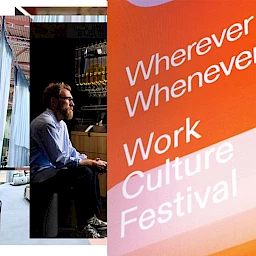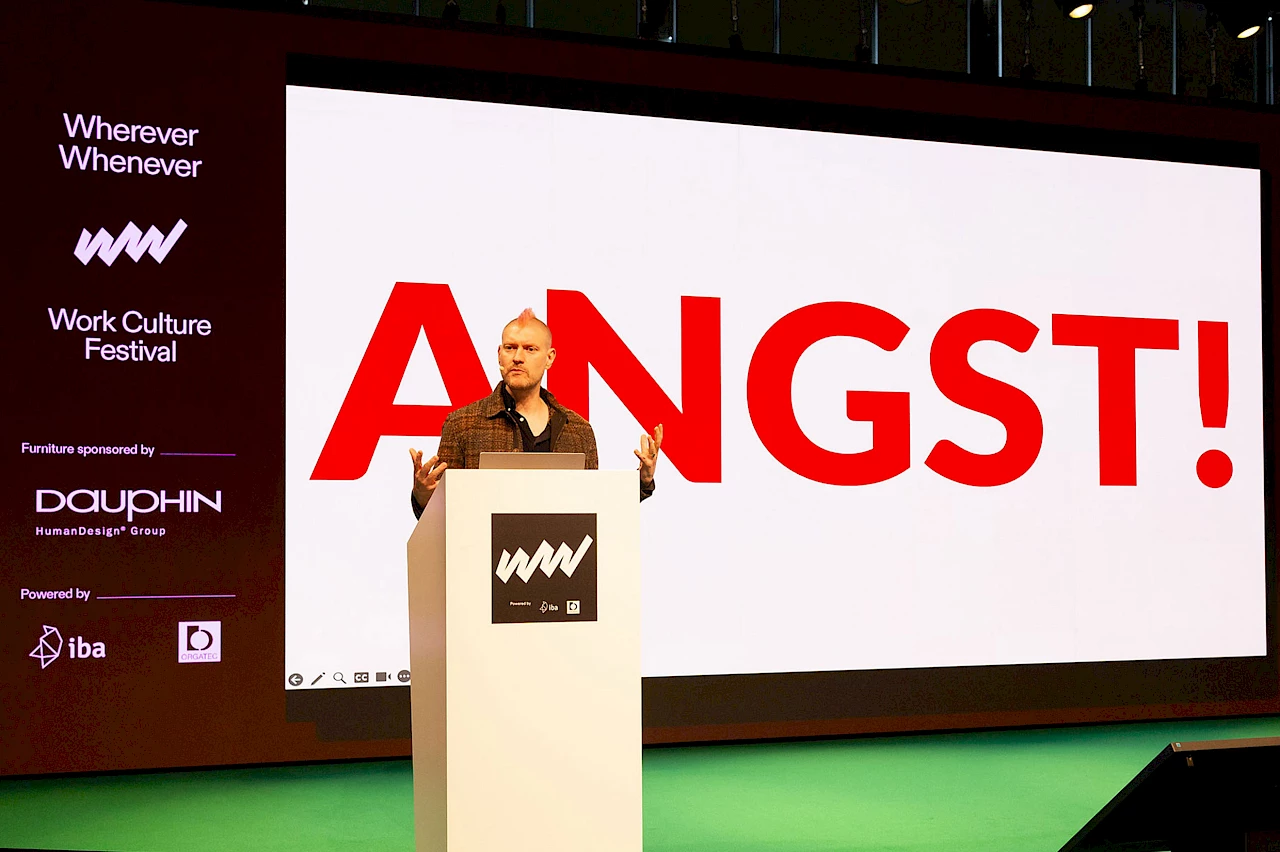Sascha Lobo is one of the best-known digital opinion leaders of our time. At ORGATEC in Cologne, he spoke about how digitalisation and artificial intelligence are changing the world of work and why an AI jolt needs to go through Germany. He is calling on Germany to overcome its fears concerning AI and establish a new culture of experimentation and investment in order to remain competitive.
Fear as an obstacle to change
Lobo began his presentation by addressing a key obstacle to change: fears and concerns about job security. This vague fear of the uncertainty of whether one’s job could be made redundant by AI paralyses people and makes them unwilling to change. Moreover, this fear is often not openly expressed. Instead, it causes people at all hierarchical levels to block projects or reject change with rational arguments that are ultimately an expression of this fear. These fears must be named and addressed, otherwise they will hinder the necessary progress and cause Germany to fall behind the leading AI nations in terms of technology.
Germany lags behind in AI investments
Lobo is convinced that the AI transformation requires investment. This means that we have to invest money in order to understand and help shape this change. And this is where the first rather large and also very relentless weak point becomes visible: investment in information and communication technologies in Germany amounts to just 1.4% of gross domestic product and is therefore significantly lower than in other countries such as Sweden, France, the UK or the USA. “Germany is just plodding along,” Lobo criticises. “And if we now realise that the work culture itself needs money to develop, then that is all the more worrying.” To underscore this point, Lobo quotes Michael Hüther from the German Economic Institute in Cologne: “Artificial intelligence is the greatest opportunity for a new German economic miracle”. And it is not only in terms of investment that Germany performs comparatively poorly. Economic performance is also growing slowly, while the USA and China have multiplied their economic power over the last three decades. The economic boost from digitalisation, even without AI, has led to a spectacular increase in economic power and productivity all over the world—but not in Germany. Lobo warned that Germany cannot afford to lag behind in AI if it wants to maintain its prosperity and competitiveness. An AI jolt is necessary if there is to be an economic renaissance, says Lobo.
How AI is transforming the work environment
AI is revolutionising existing business models through an unprecedented level of automation and increased efficiency. Particularly influential factors include the acceleration of processes, the virtualisation and scalability of resources and a radical increase in efficiency, which, in turn, enables extensive automation. This is fundamentally changing traditional work structures and turning AI-supported systems into drivers of productivity and innovation. Lobo is convinced that AI will be as much a part of work processes in the future as software is today. With the next stage of development, so-called autonomous AI agents—i.e. systems that can act independently—another level of change is within reach.
This transformation is taking place from two sides: from above through strategic corporate decisions and from below through the informal use of AI tools by employees. Here are two examples: Walmart, one of the world’s largest retailers, is already using AI-supported chatbots for negotiations with suppliers, thus achieving cost savings of up to 25 percent. What’s especially notable is that 75 percent of suppliers said they prefer to interact with chatbots because they have all the relevant information and unlimited time at their disposal. This shows how efficiently AI work processes can be established.
The transformation from below is being driven by the increasing use of AI tools in everyday life. A study from August 2023 found that around 75 percent of pupils in Germany already use ChatGPT for their homework. It’s also like that in the world of work because employees use similar tools as soon as they recognise their benefits. In this context, Lobo refers to a study conducted by MIT in 2023, which shows that employees who work with AI are happier and more productive and are less likely to resign. In view of the shortage of skilled workers, this is a crucial point. After all, the next generation, which is already familiar with AI, will hardly want to work in companies or in an environment that does without such technologies and is not open to new ideas.
Work culture needs to be changed
But what does this mean exactly? Lobo is convinced that Germany can only play a leading role again if its work culture is profoundly changed—towards a culture of trial and constructive failure. Companies must have the courage to take risks and learn from mistakes instead of striving for perfection. That’s because companies can be surprised by AI even if they are perfectly prepared—this is the first and most important realisation in the age of artificial intelligence. One example of this is Google, which was forced to declare a red alert at the end of 2022 due to the market launch of ChatGPT by OpenAI, as its business model suddenly came under massive pressure. As AI will have an even greater impact on business models and revolutionise entire industries in the future, a rethink is inevitable. According to Lobo, Germany needs a culture of “trial and error, learning and constructive failure”—a culture that allows people to take risks and make mistakes. This approach stands in contrast to the traditional German strengths of care, precision and perfection that make German machines and cars so popular worldwide. However, Lobo also warns that our previous strengths could turn into a weakness in the unpredictability of digital change. To prevent this from happening, we need a transformation of the work culture and the economy, and we need new standards. This includes technology training in schools and at work, as is already the case in China, lifelong learning and the development of AI literacy—a comprehensive knowledge of the use and possibilities of AI that goes far beyond mere prompting.
Work Culture Festival Impressions

Sascha Lobo is a journalist, blogger, digital expert and perhaps Germany’s best-known mohican wearer. He lives with his wife Jule and three children in Berlin and on the Internet. Lobo works as an author, speaker, podcaster and digital entrepreneur. He has been writing a weekly column on spiegel.de since 2011. Sascha Lobo publishes books on current affairs and is a frequent guest on talk shows. Together with Jule Lobo, he hosts the podcast “Feel the News—was Deutschland bewegt.” Further information is available at: https://saschalobo.com/
Cover photo: © IBA






